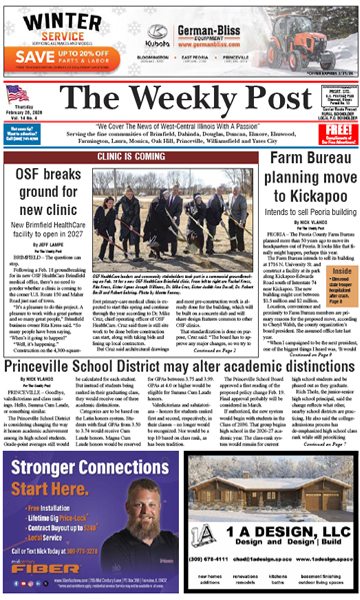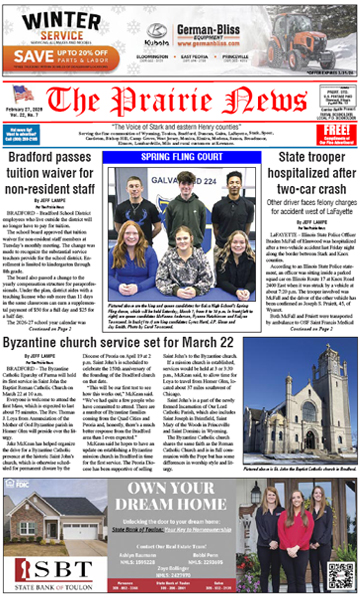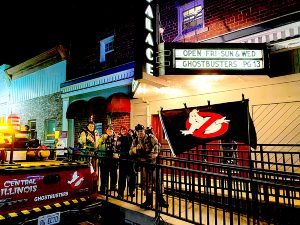
By John A. Ballentine
TOULON – Doug Murray is the last of his kind in Stark County.
A life-long dairyman and milk producer, Murray recently sat down with The Prairie News to discuss the history of Toulon area cheese making and Kraft’s influence on the county.
Murray retired from milk producing last fall and was the last farmer to have a dairy herd of cows in Stark County.
According to E.H. Shallenberger’s 1876 book, “Stark County and its Pioneers”, the Toulon cheese manufacturing company was organized in December of 1874 with cheese production beginning in the spring of 1875. It was a seasonal production, which started in the spring and continued until late fall.
“There was a brand of cheddar cheese produced in Toulon by the name of Molly Stark – it was named after the general whose name was used in naming Stark County,” Murray explained. “Molly Stark brand cheddar was a big hit in Chicago and it was the first cheese out of Toulon.”
The News researched Axel Madsen utilizing the past Stark County News articles from the early 1930s and his Sept. 4, 1975 obituary that appeared in The Stark County News. Madsen brought Swiss cheese production to Toulon, in 1932.
Axel Madsen came to the United States and Wisconsin from Køng (King), Denmark, in 1911, at age 20. In 1932, he relocated to Toulon to start his dairy business, The Madsen Milk Products Company. He also began milk and cheese companies in Tiskilwa and Tonica.
His products were sold under the name Three-T brand, which stood for Toulon, Tiskilwa and Tonica. The Toulon Milk Products Company was located just west of Toulon’s City Park and currently houses the Toulon Aquarium and Pet Store. It was there that J. L. Kraft met Madsen in 1945 and they struck a deal where Madsen sold his businesses to Kraft and became Toulon’s first plant manager for Kraft, in 1946, when production began in Toulon.
Madsen was succeeded as plant manager by Karl Rausch, Jim Hellmich and finally Del Fleege until the 1971 closing of Kraft’s cheese production in Toulon. Toulon’s Max Hatfield became warehouse manager when the Kraft building became a cheese storage warehouse, in 1971.
Martha Reisemeyer became warehouse manager in 1989 for Kraft and later for the Toulon Cold Storage facility after Kraft sold the building. She managed it until the permanent closure of the building, in 2009.
“During World War I, there were several cheese producing companies that sold cheese in wooden boxes and a pasteurized process gave it shelf life,” Murray stated. “It was pasteurized, processed cheddar and American cheese. In grocery stores it would be located sitting around the meat counter.
“At the conclusion of World War I, there was all this cheese out on the docks on the east coast that the rats were starting to get to. That cheese could go for relief of European countries.”
Murray continued, “The European countryside was devastated after World War I and it disrupted cheese production. The leftover cheese from the war effort was J.L Kraft’s claim to fame. He left in a government office his competitors’ cheese and his own processed canned cheese on a heating radiator. The other guys’ cheese blew up, but Kraft’s stayed on the radiator all night and didn’t blow up.
“So, he got the contract to take the surplus cheese and reprocess it – the cheese on the docks – and then it could be shipped to Europe. That’s what made his millions of dollars! It also established him in Illinois and Wisconsin.”
In 1946, Swiss cheese production began in Toulon at the new facility Kraft built on the east end of Toulon.
“Illinois was the largest producer of Swiss cheese in the nation. Swiss cheese production boomed after World War II because of nationwide demand,” Murray said. ”The soldiers who went through Italy and France from that area close to Switzerland enjoyed the cheeses that were made in those areas and fell in love with Swiss cheese. When they returned to the United States, they still wanted Swiss cheese and that created the nationwide demand.”
Toulon’s Kraft plant produced cheese from 1946 until December of 1971. In the November 1971 issue of The Stark County News, Kraft cited inadequate milk supplies for the main reason for closing the facility’s production.
“Kraft could only buy Grade B milk and surplus Grade A milk,” Murray noted. “So, none of the farms around here could produce for Toulon anymore because farmers had switched from Grade B to Grade A milk.”
“Kraft didn’t lock the doors on Toulon,” Murray recalled. “The EPA (Environmental Protection Agency) told Toulon that they needed to have some adjustments made to the water quality coming out of the Toulon sewer. The water coming out of the Kraft plant had a lot of phosphorous from the cleaning detergents and there needed to be a way to slow that flow up on the discharge side, so that it would comply.
“Kraft said their deal was that Kraft would pay half of the renovations and they would procure a grant for 25 percent of the cost. Toulon would have to match that 25 percent. Milledgeville took the deal, which was offered the same deal as Toulon. Toulon rejected it and within a week, they received notification of the plant closure.”
Murray stated, “There was never a better time in Toulon then a mine running between Wyoming and Toulon and that employment, and the Kraft plant. Toulon had three shifts at Kraft.”
Economically, Toulon never recovered from the Kraft production stoppage.
“You can see what Toulon has now,” Murray concluded.







